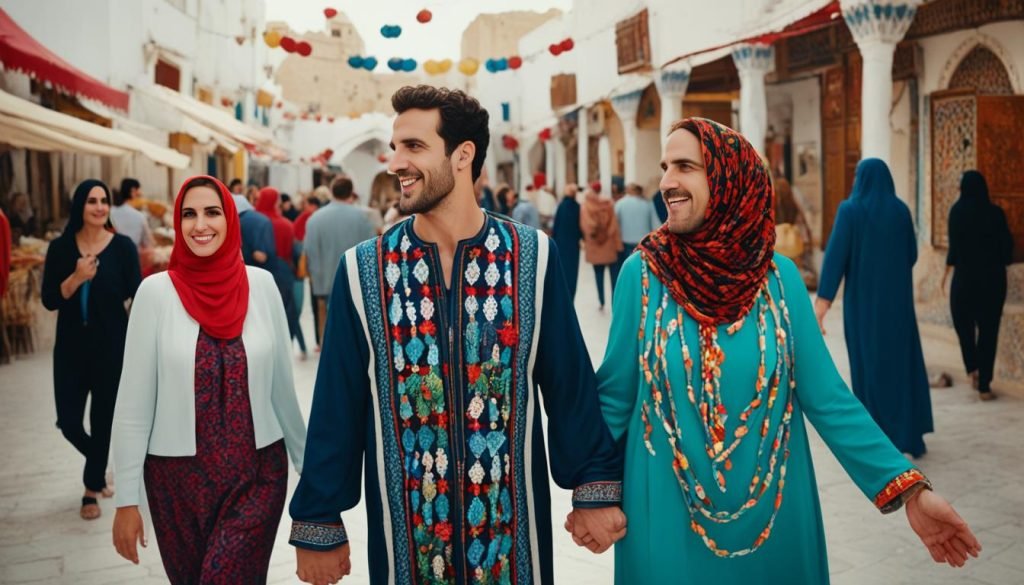Holding hands is seen around the world as a simple sign of connection. It’s a meaningful way to show closeness and warmth. Picture walking through Tunisia’s markets and ancient sites, with the warm air around you. It feels natural to hold the hand of the person you’re with. Yet, in Tunisia’s diverse culture, touch can mean more than affection. Under the stars, it’s wise to be cautious with public affection, following the local rules on holding hands.
In Tunisia, holding hands is more than a simple act; it’s influenced by cultural norms. Every touch carries tradition and respect. No matter where I go, from bustling markets to historic Carthage, I try to show the same respect that is rooted in Tunisia’s culture.
When in Tunisia, showing understanding and respect is key. It’s about connecting with the culture as much as with a person. We must be aware of how public affection is seen, respecting that what is heartfelt here might not be the same elsewhere.
Key Takeaways
- Understanding the Tunisia hand holding rules is crucial for respectful interaction.
- Public affection in Tunisia is shaped by its traditional and religious contexts.
- Considering cultural norms in Tunisia helps avoid unintended offence.
- Public displays of affection should be modest and context-aware.
- Respect for local customs enhances the travel experience in this diverse country.
Understanding Tunisian Cultural Norms
Traveling to Tunisia means embracing its culture deeply. I respect their customs on physical contact and understand their origins. The rich history of Islam paints Tunisian social norms. It shapes how people interact.
The Role of Islam in Tunisian Etiquette
Islam’s principles deeply influence Tunisian manners. These principles go beyond faith, setting societal norms. For instance, I’m careful with public displays of affection to honour their modesty values.
Respecting Local Traditions and Religious Considerations
In my talks with locals, I’ve learned how important gestures are in Tunisia. They mirror the country’s religious roots. During Ramadan or at sacred places, I’m extra careful. I want my actions to show respect for their traditions.
Below is an outline summarising the key aspects of Tunisian etiquette:
| Aspect | Details | Examples |
|---|---|---|
| Dress Code | Modest, especially outside holiday resorts | Covering knees and shoulders |
| Physical Contact | Conservative, with attention to gender interactions | Men wait for women to initiate handshakes |
| Public Behaviour | Measured, respecting Islamic teachings | Avoid PDA, especially during Ramadan |
| Religious Observance | Behave respectfully near religious sites | Join in silence during prayer times |
Following these guidelines has made my visits respectful and meaningful. It helps me connect with the heart of Tunisian life.
Tunisia Hand Holding Rules for Locals and Tourists
“Can You Hold Hands In Tunisia?” is a question I often ponder as a traveller. It’s crucial for understanding how to show affection in public there. Even something simple like holding hands is complex in Tunisia. It’s usually okay under certain conditions. Locals might hold hands, but there are unwritten rules to follow.
In the busy streets of Tunisian cities, you might see young couples holding hands. Yet, it’s important to know when it’s appropriate. Public displays of affection are more accepted in cities. There, tradition meets modernity. But, respect for local customs is still expected.
- Hand holding is fine for married or engaged couples, especially in tourist spots.
- Be more cautious in conservative areas or during religious times, respecting local feelings.
Being aware of your surroundings is vital when visiting Tunisia. For those wondering about hand holding, it’s all about understanding and respecting the local context.
If unsure, look at how locals act and use that as your guide.
Hand holding is a simple gesture of affection but is less common in Tunisia than in the West. Always be mindful of your actions. Make sure they’re respectful to the local ways – it’s a universal sign of respect.
Public Displays of Affection: Navigating PDA in Tunisia
In Tunisia, feelings about public affection vary a lot from one place to another. There’s a wide range of reactions across the country, showcasing its rich cultural differences. A trip from the lively streets of Tunis to quieter rural areas shows this contrast in attitudes towards public closeness.

Differing Attitudes Towards Public Affection in Urban and Rural Areas
In cities like Tunis and Sousse, there’s a bit more freedom with public affection. Things like holding hands or a quick kiss are seen. But, everyone still respects what’s considered proper, keeping the community’s feelings in mind.
In rural areas, however, people are more traditional. Public displays of affection are less common to respect local customs.
Legal Implications of Public Intimacy
Understanding the laws about public intimacy in Tunisia is important. More noticeable PDA might lead to fines or jail time. However, ‘kissing cafes’ offer couples a place to be affectionate without fear of breaking the law.
Can You Hold Hands In Tunisia? – The Tourist Perspective
Many tourists visiting Tunisia wonder about hand-holding. They ask if it’s okay without upsetting local customs. Can You Hold Hands In Tunisia? This question doesn’t have a simple yes or no. It depends on where you are and who you’re with.
In Tunisia, people might seem reserved about physical contact. But if you’re married or engaged, showing affection is fine. The trick is to be aware of how locals react. Doing this helps you fit in while being yourself.
Hotels show how cultures mix, with staff used to different customs. Here, couples holding hands is usually okay. Because the staff meets tourists all the time, they’re more accepting, as long as you respect Tunisian culture.
I recall walking along the bustling streets of Tunis, the capital, hand-in-hand with my partner, absorbed in the vibrant city life. Yet, it was the subtle acts—like making way for an elderly couple at the market or greeting a local with a warm smile—that bridged the cultural divide and fostered a welcoming atmosphere.
If you love being close when travelling, Tunisia welcomes you. Can You Hold Hands In Tunisia? Yes, but do it with care. Remember, we are guests in a country full of traditions and social rules.
- Mind your surroundings, especially in more conservative rural areas.
- Seek to understand local practices through observation and respectful inquiry.
- Consider the setting—public displays of affection are more accepted in tourist-centric areas.
To wrap up, understanding Tunisian ways of physical contact is key. Be observant and respectful. This approach ensures your visit is both enjoyable and sensitive to local traditions.
Conservative Dress and Behaviour: What is Expected?
Exploring Tunisia’s vibrant streets and markets shows me how locals view dress and behaviour. For travellers, respecting these customs means more enriching experiences.
From Tunis’s busy streets to Djerba’s peaceful villages, dress codes vary. But conservative clothing is a key part of Tunisia’s culture. Visitors need to dress modestly, especially in religious places or conservative areas.
Appropriate Attire in Public and Religious Spaces
When visiting sites like the Zitouna Mosque or El Ghriba Synagogue, I dressed appropriately. Clothes that cover shoulders and knees are essential. Long skirts, trousers, and sleeved tops work well for respectful travel here.
Understanding the Unspoken Rules of Conduct
It’s not just clothing but also behaviour that shows respect for Tunisian norms. Speaking softly and avoiding public affection are good practices here. Locals appreciate this respectful behaviour.
Whether at a souk or by the sea, acting with sensitivity is important. Respecting local customs makes your time in Tunisia better and more genuine.
Exploring Romantic Relationships and Etiquette in Tunisia
In Tunisia, understanding romance and holding hands etiquette needs care. It’s key to respect Tunisian social norms when showing affection publicly. Some areas are conservative. So, it’s wise to be cautious, especially there. Holding hands is generally okay but think about where you are and who’s around.

Gestures like hugging or kissing need extra thought. Even though common in many places, they’re not in Tunisia. Travellers and expats should learn these customs. This helps in showing love respectfully, without clashing with local traditions.
There are also laws on relationships to consider. Living together without marriage is common for tourists but not legally accepted. Knowing this is important for a long-term stay.
Love knows no borders, but it does warrant an adherence to local etiquettes to flourish amidst diverse cultural landscapes.
Tunisian Customs on Physical Contact and Gender Interactions
When I first learned about Tunisian customs on physical contact, I saw how important these are. They help visitors blend in smoothly. Even a simple handshake has its own rules in the cultural norms in Tunisia.
I noticed some rules during my visits. For example, in Tunisia, men wait for a woman to extend her hand before a handshake. This shows a high level of respect for women’s space and choice. Such respect is key in all physical interactions there, deeply woven into society.
In homes or at meals, people prefer to use the right hand for eating and sharing things. This habit shows good manners and has deep religious and cultural meanings.
- Social Greetings: Wait for a woman to extend her hand first in mixed-gender situations.
- Dining Etiquette: Always use your right hand for eating to align with local cultural norms.
- Public Comportment: Understand the limitations on public displays of affection to respect cultural sensitivities.
As I mingled with the locals, I noted how these intricate practices around physical contact not only prevented potential faux pas but also enriched my understanding of Tunisian culture and the inherent respect found within it.
To summarise, understanding Tunisian customs on physical contact and cultural norms in Tunisia is crucial. It allows for respectful and smooth social interactions. This knowledge leaves a good impression and helps build real friendships.
Social Conventions and Meeting Etiquette in Tunisia
As soon as I arrived in Tunisia, I noticed that Tunisian social norms and cultural norms in Tunisia are key to forming positive and respectful relationships. These social rules are deeply rooted in Tunisia’s rich history and everyday life.
For instance, when you meet someone, expect a warm greeting. People often ask about your family and health. This shows interest in others and builds a community feeling, respecting Cultural norms in Tunisia.
Guidelines for Greeting Across Genders
In Tunisia, how you greet someone depends on their gender and culture. I learned to watch and follow what locals do, especially in traditional settings.
- Men should wait for a woman to extend her hand first.
- If a handshake is not offered, nodding with a smile works well.
- Public physical contact between men and women is usually limited.
Respecting these greeting rules shows you understand Tunisian culture. It helps you gain respect from locals.
Gestures and Body Language: Communicating Respectfully
In Tunisia, body language plays a big part in Tunisian social norms. Some gestures mean you agree or are happy, while others might be rude. Learning these has helped me get along in social situations.
| Gestures | Meaning |
|---|---|
| The hand placed over the heart | Respect or sincerity |
| Palms facing upwards | Patience or openness |
| Nodding gently | Agreement or acknowledgment |
Using the right gestures when talking has helped me connect better with locals. It brings people together and starts meaningful conversations, based on cultural norms in Tunisia.
Conclusion
The question ‘Can You Hold Hands In Tunisia?’ cannot be answered with just yes or no. It’s more complex. It’s about understanding Tunisia’s rules on hand holding, which blend culture and religion. As a traveller, I’ve seen that by respecting local ways and being discreet, tourists can hold hands. But, it’s important to always be mindful of the locals and the setting.
When it comes to public shows of affection, Tunisia has its own rules, especially for visitors. It’s clear that respecting the local customs is key. By doing so, tourists can fully enjoy the warmth and hospitality Tunis offers. Whether you’re in busy Tunis or the peaceful countryside, respecting Tunisian norms makes the visit better.
So, my tip for travellers is always watch for social signals and respect the local culture. Knowing the rules on holding hands, and public affection, is part of respecting Tunisia’s rich culture. My time here has shown me that such respect is valued and returned. It makes the experience memorable for everyone.







